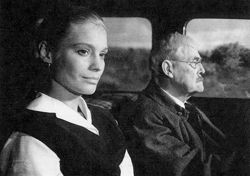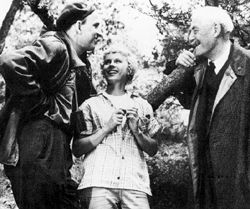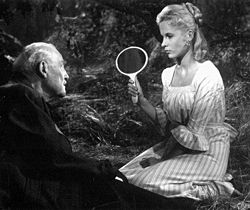|
How old is the road movie? Probably as old as cinema itself, so malleable is the symbol of the long distance car ride as emotional/spiritual sojourn. Less a genre and more an extended stylistic device, the road trip is predicated on a series of stock digressions that invariably include pit stops, hitchhikers, and fender-benders whose purposes are to bring the traveler face to face with those who might alter his life. Though certainly not the first road movie or necessarily the best, Ingmar Bergmanís Wild Strawberries (Smultronstallet) is arguably one of the most influential. The story is simple enough: Professor Isak Borg (Swedish silent movie titan Victor Sjöström) is a retired physician who, despite his reclusive lifestyle, has decided to hit the road to accept an honorary degree from his alma mater. Along the way, he encounters people from his past and some new ones too, each of whom triggers a voyage into the sub-conscience in which Isak learns that despite his material success, he has led a rather cold life. Copied by such diverse films as Five Easy Pieces and Summer Wishes, Winter Dreams, and openly parodied in Woody Allenís Deconstructing Harry, Wild Strawberries has become the prototype serious filmmakers invariably turn to when they want to make a serious road picture.
| | 
Ingrid Thulin and Victor Sjöström in
Wild Strawberries. | |
The Criterion Collectionís recent DVD release of the film may interest those of us who are well-versed in the imitations but ignorant of the real thing, and indeed, that is probably most people. What will our reaction be? Disappointment, no doubt, but the kind of disappointment that stems from that feeling of having seen it all before, from that "whatís so great about this?" ambivalence we experience after watching a "classic" movie thatís been hyped by the critics. Itís a valid, if anachronistic, response: as with any movie thatís been copied and cribbed from, Wild Strawberries has been rendered retroactively commonplace. Bergmanís time-shifts simply donít, or canít, withstand years of watered-down imitation. Even more innovative flourishes, such as his double-casting of Bibbi Anderson as the young Isak Borgís unfaithful girlfriend, Sara, and later as a present-day hitchhiker also named Sara, will feel quaint to some viewers when they compare it to more audacious double-casting in more recent films such as Bunuelís That Obscure Object of Desire and David Lynchís Mulholland Drive. Still, when viewed in isolation, Bergmanís coup-díoeuil is quietly efficient in the way it reconciles past and present. You can almost sense Isakís emotional wounds beginning to heal when the present-day Sara caresses his cheek or flashes a smile, as if the old Sara were saying sheís sorry.
Wild Strawberries is filled with such reconciliations. They are warm and pleasant, but they are essentially Hallmark truisms: be nice to one another; love your children; be kind to your spouse, etc. Did we really need to take a road trip to learn all of this? It all seems too simple-minded for Bergman, who typically traffics in the melancholy and downtrodden. His conception of Borg as a frigid, closed-off husband and father is the most Bergmanesque aspect of the film, and ironically enough, itís the weakest, too. In her many writings about the film, Pauline Kael takes Bergman to task for creating a series "conventional" and "unconvincing" flashbacks wherein Borgís crimes against his loved ones are spelled out in obvious terms. They include his failure to reach out to his fiancee Sara, his lack of warmth for his wife, and his almost complete absence from his sonís upbringing. These are serious breaches of manly duties, but they are hardly monstrous acts. By todayís standards (and perhaps yesterdayís too), Borg is a bit ordinary, a typical workaholic dad who ignored those he cared for. When he takes his metaphysical tour of his past, he sees for the first time that it was his coldness that allowed his own brother to seduce Sara away from him and that, years later, drove his lonely wife into the arms of another man. Itís a Dickensian reckoning in scope and theatrical pomp, but Isak Borg is no Scrooge Ė heís clueless, not evil Ė and his punishment seems disproportionate to the crime.
| | 
Director Ingmar Bergman with Bibi Andersson and Victor Sjöström on the set of Wild Strawberries. | |
As we watch the DVD, particularly filmmaker Jörn Donnerís interview entitled Ingmar Bergman on Life and Work, we are reminded again and again that for Bergman cinema is therapy, and that many of his screenplays are, if not autobiography, fictionalized memoir of his family life. Thereís little doubt, for instance, that Isak Borg is a thinly veiled version of Bergmanís own father, a pastor and relentless disciplinarian whom Bergman famously detested and even demonized in his later films such as Fanny and Alexander and the Bille August-helmed The Best Intentions. Though not immediately apparent, the similarities between Isak Borg and Bergman Sr. are startling to say the least. Both were career-men ensconced in a cloistered society of semi-academia (medicine, the clergy); both were emotionally shut off from their families; both were widowers in their old age; and, by far the most fascinating, both came to an eventual peace with their estranged sons. In the final scene, the old Isak Borg is lying in bed in his sonís house, having completed his road trip and received his degree. His son, Evald (Gunnar Björnstrand), is a stern man not quite middle-aged but already embittered, and when he enters the room, thereís a kind of tension that arises whenever two people recognize too much of themselves in the other. Isak tries to reach out to Evald Ė he forgives a debt and inquires about the state of his sonís troubled marriage Ė but itís not so much an attempt at reconciliation as it is a rapprochement. Thereís much unfinished business here, Bergman seems to say, and itís clear heís speaking from experience.
If men are stolid creatures, then women are emotionally flexible, able to forgive and forget with almost superhuman ease. Evaldís wife, Marianne (Ingrid Thulin), is an uncertain woman in the beginning of the movie, having left her husband after his indifferent reaction to her pregnancy. By the end of the movie, after having shared driving duties with her father-in-law, she is no more certain than before, but she believes that if she can love this old man with all of his faults then she can also love his son with whom he has so much in common. Itís an oversimplified resolution; Marianne deserves her own private road trip to work things out. But her function in the movie, like the present-day Saraís, is to show how lovable Isak Borg is. As audience surrogates, they are absolutely smitten with the old man, flirting with him and casting coy smiles as if to say, "See, we love him. Shouldnít you?" Though forced, itís fascinating how readily Thulin and Andersson embody Bergmanís notion of the female ideal: fiercely independent but warm, flirtatious but essentially loyal, free-thinking but ultimately forgiving Ė in other words, his mother.
| | 
Victor Sjöström and Bibi Andersson in
Wild Strawberries. | |
Bergmanís mother Karin, he tells us, represented all that was good and pure about the female. A strong woman, she reportedly stood up to the abuse of her husband while raising young Ingmar and his brother on her own. "Anything that I do of value," Bergman says in Donnerís interview, "has its roots in my childhood." Itís the womb-like childhood to which Isak Borg returns in the movieís final scene when, after Evald takes his awkward leave, Marianne takes the old man in her arms and kisses him goodnight. It is the only real physical contact Isak has had in the movie. Dressed in pajamas and snug under a giant blanket, he has become a child again. But itís an ideal childhood, one he wished heíd had, and certainly not the one he actually lived. That one, we are lead to believe, was a miserable experience. A detour earlier in the movie establishes Isakís still living mother as an imperious dowager obsessed with the past and living in a mausoleum-style apartment. Sheís the opposite of Marianne, and therefore her competitor for Isakís affection. That Bergman ultimately supplants her with Marianne in the final scene of the movie points to some universal need to rewrite oneís childhood as one would like it to have been, and to ultimately return to a womb of oneís own choosing.
At times, Isak Borg seems more like Bergman than as he does Bergman Sr., no more so than when we catch a glimpse of Bergmanís own writing desk in the Donner film. It is a spare surface, almost Spartan, and compulsively denuded of clutter. To the right is a picture of Bergmanís wife Ingrid, who died in 1995. Compare it to the old Isak Borgís desk shown early in the film and the similarities jump out at you: spare, neat, with a picture of a deceased wife to the side. As Bergman was only 38 when he made Wild Strawberries, this parallel qualifies as either a freak coincidence or a self-fulfilling prophecy. Is Bergman looking into the future? Does he like what he sees?
 | DVD cover artwork for Wild Strawberries.
[click photo for larger version] |
Peter Cowieís audio commentary avoids these issues, preferring to deconstruct the masterís technique rather than the master himself. A film journalist, Cowie is adept at pointing out parallels with other Bergman films and is particularly fond of throwing in the odd anecdote about his past encounters with Bergman. Though stiff, his commentary is exceedingly well-researched and helpful too in pointing out things we might miss, like a feuding couple who appear early in the movie and then again later, in vastly different form, in one of Isakís dreams. (Cowieís description of the bickering duo as "Strindbergian" is right on the money.) Reserving much of his praise for veteran Swedish filmmaker Victor Sjöström who plays Isak Borg, Cowie rightfully acknowledges not only his contribution to the film but to the whole of Swedish cinema. A silent film director and actor, and reportedly the most handsome man in Sweden, Sjöström was near death when he made Wild Strawberries. His frailty is palpable, but so is the sheer gravitational force with which he holds the entire movie together. His screen presence is so powerful that, according to Cowie, Bergman acknowledged that this was really Sjöströmís movie. These two icons of Swedish cinema donít cancel each other out: they share a common identity. Victor Sjöström became Isak Borg who turned into Ingmar Bergman. When Bergman tells us that he arises at five o'clock each morning to prepare for work, we sense that Isak Borg will also rise from his sonís bed early tomorrow morning, put his suit on, and drive back home where his work, and his desk, await him.
Wild Strawberries is now available on DVD from the Criterion Collection in a new digital transfer. The disc's special features include a 90-minute documentary by filmmaker Jörn Donner, Ingmar Bergman on Life and Work; a stills gallery, featuring rare behind-the-scenes photos; and audio commentary by film scholar Peter Cowie. Suggested retail price: $39.95. For more information, check out the The Criterion Collection Web site.
|



